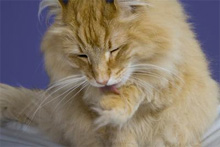Medical Management of Hyperthyroid Cats
Medical treatment is used for long term disease management or in the short-term to stabilize hyperthyroid cats before surgery or radio-iodine therapy. The drugs used (mercaptoimidazoles) block the synthesis of thyroid hormone (thyroxine) in the thyroid gland, bringing the elevated hormone levels back to normal and resolving the signs of hyperthyroidism.Medical management controls the disease but is not curative and therefore treatment is lifelong and discontinuing medication will result in a rapid return of the disease signs.
Starting on medical treatment
Blood samples and revisiting your veterinarian
Once treatment has been started, you will need to visit your veterinarian regularly for monitoring of your cat’s thyroxine, clinical signs and other blood parameters to ensure that dosage is appropriate for your cat and to also to detect possible rare adverse effects of medication (see below).
Once your veterinarian is confident your cat’s condition is stable, you will normally only need to visit every three to six months for a check up. These check ups are essential to ensure that your cat remains happy and healthy. Please contact your veterinarian for advice if your cat becomes unwell at any time.
Giving anti-thyroid medication to your cat
Many anti-thyroid medications come in tablet form. Some tablets are sustained release and treatment can be started with once daily dosing, others usually have to be dosed two or even three times daily initially. Your veterinarian will inform you whether the medication your cat has been prescribed can be given with food or not, this must be consistent every day.
More information – Easy steps for pilling your cat.
What to look out for
If you start to see any of the signs of hyperthyroidism returning (e.g increased appetite and thirst, weight loss, hyperactivity, nervousness, weakness, breathing difficulties), your cat’s treatment may need to be adjusted. Please contact your veterinarian.Some cats develop side effects associated with the anti-thyroid medication they are given. These side effects are generally mild (lethargy, inappetence, vomiting), start within a few days of first treatment and resolve quickly. More serious side effects are quite rare – such as liver problems, skin reactions, blood disorders and bleeding tendencies – but these can occur. Please contact your veterinarian if you notice any of these effects or have any concerns about your cat’s progress.

The aim of treatment is to reduce the level of and ultimately the effects of excessive thyroid hormone.

